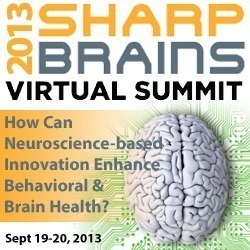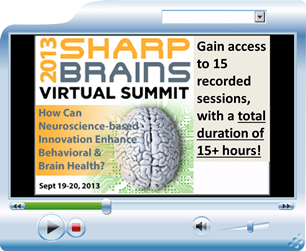Top 30 Highlights from the 2013 SharpBrains Virtual Summit: The latest on Brain Research, Health and Innovation
 Over 30 speakers and 170 registered participants discussed the latest on brain research, health and innovation at the fourth annual SharpBrains Virtual Summit, held in September 2013. Here are some of the fascinating highlights* that can help identify emerging opportunities and prepare for significant changes likely to occur in the next 3–5 years.
Over 30 speakers and 170 registered participants discussed the latest on brain research, health and innovation at the fourth annual SharpBrains Virtual Summit, held in September 2013. Here are some of the fascinating highlights* that can help identify emerging opportunities and prepare for significant changes likely to occur in the next 3–5 years.
What surprised/ impressed us the most (in brackets, the Speaker who prompted the highlight):
- How the Human Brain Project is building a comprehensive brain simulation web portal for hundreds of neuroscientists to find principles that can not only optimize brain health but also computing, manufacturing and IT networks. (Sean Hill)
- How different Brain Health will look in 2020. i.e. we may well see a “self-administered annual brain health check-up” (Alvaro Fernandez) building on current tablet-based cognitive baseline tests. (Joan Severson)
- Two billion people worldwide suffer from brain based health and productivity challenges, and many could benefit from evidence-based interventions delivered over the web via computers/ mobile. (Alvaro Fernandez)
- The increasing role positive psychology is playing in leadership and wellness initiatives of large organizations. Many companies are using meditation programs at work, helping place the human brain at the center of the human resources equation. (Hyong Un)
- How health providers can expand focus to include emotional and cognitive health. Kaiser Permanente’s simple and powerful posters are beautiful and inspiring. (Alexandra Morehouse)
- It takes 17 years to translate scientific/ medical discoveries into health practice — far too long given current needs. New models of discovery and translation, based on sharing and collaboration, can help close gap. (Misha Pavel)
- Big Data can provide the large longitudinal databases to uncover relationships between variables to better target research efforts. For example, there’s significant variability of cognitive performance across various dimensions (e.g. time of day, amount of sleep, alcohol consumption etc.) as detected by analysis of large compilations of data in Lumosity’s platform. (Daniel Sternberg)

- How a young woman decided to “fix” her own brain and in the process helped not only herself but developed a fundamental new approach to special education. (Barbara Arrowsmith)
- The current frameworks for brain health diagnosis and care are based on insufficient evidence and on pharmacological interventions that seldom work. (Robert Bilder)
- Non-invasive brain training programs probably won’t require FDA approval because the FDA is mostly concerned with safety, rather than efficacy. (Robert Bilder)
- The breakdown of how much time/effort is required to practice different types of meditation/relaxation exercises, and why Kirtan Kriya meditation may be more efficient and scalable than other forms of meditation as a public brain health measure for Alzheimer’s Disease prevention. (Dharma Singh Khalsa)
- How biometrics can help enter into a meditative state more quickly and deeply. (Deborah Rozman)
- The range of brain health tools and emphasis on personalized care at the new Brain Gym at UCLA and the Brain Fitness Center at Walter Reed National Military Medical Center. (Robert Bilder; Kate Sullivan)
- The frank and direct discussion about challenges faced by the Apollo Brain Data Exchange Portal to encourage sharing of detailed research results. Since the majority of brain and health research is funded by the federal government, it should be in the public domain as soon possible. (General Peter Chiarelli)
- The creative project to connect thousands of people’s brain activity to illuminate Niagara Falls and other landmark public spaces in Canada. (Ariel Garten)
- Why Discovery Communications chose to make a significant and unprecedented investment in Lumos Labs. (Dan Fox)
- How Posit Science is negotiating win-win partnerships with non-profit organizations like AAA, AARP, PBS. (Jeff Zimman)
- How people can develop new habits to rewire the brain and build resiliency. (Evian Gordon)
- Why do we spend more time, money and effort on the body parts we see in the mirror (hair, face, teeth, nails, etc…) rather than the body parts which we can’t see but are more important in terms of health and quality of life (heart, brain, etc..) ? (Alvaro Fernandez)
- How The SharpBrains Guide to Brain Fitness (April 2013; 284 pages) builds on practically all of the themes treated during the summit, and helps put the brain “in the mirror” (Alvaro Fernandez)
- The lion’s share of brain health funding is going to pharmaceutical interventions, even if that is not where the current evidence points to. (Dharma Sing Khalsa)
- How much EEG-based applications have evolved over the last few years, including the role they played helping the US archery team ( Stanley Yang) and how attractive they are becoming to consumers. (Ariel Garten)
- How we can apply behavioral economics to improve health-related decision-making in smart and simple ways. (Josh Wright)
- How to use Kickstarter or IndieGogo to crowdfund innovative brain fitness products such as the new Emotiv Insight EEG headset. (Tan Le)
- How to combine physical therapy and cognitive training to drive positive neuroplasticity. (Bruce Wexler)
- Using Nintendo games to introduce people to cognitive training and then migrate them to “serious” home-based programs. (Kate Sullivan)
- How several Asian countries are supporting innovation better than the US thanks to more clear regulatory frameworks and direct support for mainstream educational applications of EEG. (Stanley Yang)
- If increasingly the real value is in the aggregated data and intelligance rather than the brain assessments or training per se, what does that mean in terms of protecting and sharing that data? (several speakers)
- Gait and other motor coordination functions can be used as biomarkers of cognitive health (Misha Pavel). What is the role of temporal processing in cognitive capacity? (Kevin McGrew)
- Self-care is a huge gap in brain health care. Providers, researchers and government agencies focus too much on how professionals can cure illness, rather than on what all adults can do to prevent them and improve their own quality of life. (Elizabeth Zelinski)
Which of these highlights seem more surprising or relevant to you?
*Thanks to Summit Participants Nikhil Sriraman„ Steve Zanon, Deborah Zamin, Matthew Barrett, Nelson Calderon, Ellen Somers, Susan Diamond and Julian Sevillano, for sharing some of their key impressions.
 Important Note: All 15 SharpBrains Summit sessions were recorded, and 15+ hours of recordings are available now. Learn Here How to Access Them, so you can understand those 30 highlights in much more depth, and discover many more.
Important Note: All 15 SharpBrains Summit sessions were recorded, and 15+ hours of recordings are available now. Learn Here How to Access Them, so you can understand those 30 highlights in much more depth, and discover many more.


